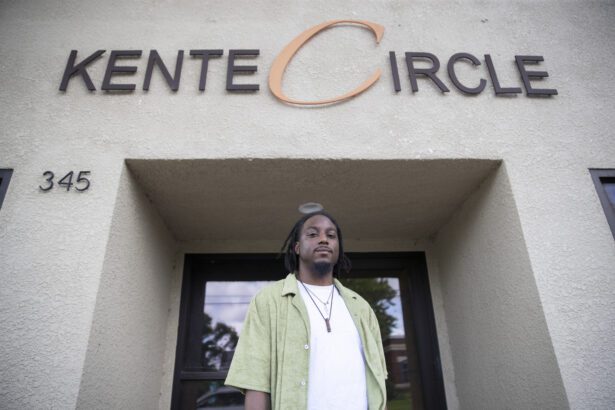supersizer/ Getty Images; Illustration by Austin Courregé/Bankrate
Main points to remember
- Black-owned businesses in the U.S. employ more than 1 million Americans.
- Studies indicate that Black entrepreneurs encounter more obstacles than white entrepreneurs in obtaining necessary funding, even with a strong credit history.
- Black-owned businesses play a crucial role in bridging the racial wealth gap.
Minority-owned businesses are those that are at least 51 percent owned, operated and controlled by a minority group. Black- and African-American-owned businesses fall under this umbrella.
Unfortunately, longstanding racial disparities and systemic biases in the U.S. have made it challenging for Black entrepreneurs to succeed. More recently, inflation and rising interest rates have presented additional challenges for small business owners, overshadowing the previous impact of the COVID-19 pandemic.
Despite these hurdles, the number of Black-owned businesses in the U.S. continues to increase, providing employment to over 1 million Americans across the country.
Statistics on Black-owned businesses
Key statistics
- There are over 161,000 Black-owned businesses in the U.S., according to the Census Bureau.
- Black-owned businesses employed 1.4 million workers in 2021.
- Black-owned businesses represented about 3% of U.S. firms categorized by the owners’ race or ethnicity in 2021.
- Almost one-third of Black-owned businesses in the U.S. operate in the healthcare and social assistance sectors.
- 53% of Black-owned businesses were owned by men and 39% by Black women in 2021.
- In the fiscal year of 2023, the SBA backed 4,781 loans for Black-owned businesses, amounting to $1.45 billion.
- Over 3.4 million (12.7 percent) of nonemployer businesses are Black-owned.
The significance of Black-owned businesses
Black-owned businesses are vital to our nation for various reasons.
-
Historically, businesses owned by people of color in the U.S. are much more likely to serve a local market and prioritize their communities regardless of profit. Notably,Nearly half of Black business owners, at 46 percent, stated that community support was a significant motivation, a higher proportion compared to white business owners at 24 percent and all minority business owners at 35 percent. A study conducted by Brookings revealed that minority-owned businesses, particularly Black-owned ones, often conduct most of their transactions within their local neighborhoods, contributing to community growth and positive outcomes, as stated by Larry Ivory, President and CEO of the Illinois State Black Chamber of Commerce.
Dismal statistics from the Federal Reserve highlight the substantial wealth disparity between Black and white households in the U.S., with Black households possessing 77 percent less wealth on average. Promoting and supporting Black-owned businesses play a crucial role in narrowing this racial wealth gap and increasing economic opportunities for individuals of color.
Moreover, large corporations pledging financial support to Black communities often lack diversity within their own structures, leading to a disconnect between their initiatives and the communities they aim to assist. Larry Ivory emphasizes the importance of having businesses that reflect and uplift their respective communities to inspire future entrepreneurs and foster economic success. Intentional efforts must be made to empower Black and minority businesses to prevent further economic disparities within local communities and maintain global competitiveness.
### Common challenges faced by Black entrepreneurs
– Only 5 percent of Black Americans possess business equity, significantly lower than the 15 percent of white Americans.
– Black entrepreneurs encounter difficulties in securing full financing even with strong credit profiles, being half as likely as white entrepreneurs to obtain complete funding.
– On average, Black entrepreneurs start their businesses with $35,000 in capital, substantially less than the $107,000 capital average for white entrepreneurs.
– Concerns over lender approval deter 46 percent of Black business owners from seeking financial support, a larger percentage compared to 36 percent of white business owners.
– Despite constituting 41 percent of all Minority Business Enterprises (MBEs), Black businesses generated only 19 percent of revenue in 2021.The challenges faced by Black entrepreneurs in obtaining business loans are exacerbated by historical racial wealth gaps and systemic biases. Efforts to support and empower Black-owned businesses are crucial in addressing these disparities and fostering a more inclusive and equitable entrepreneurial landscape.The Federal Reserve study reveals that Black business owners face challenges in securing funds compared to white business owners. Only 16 percent of Black business owners received all the financing they applied for, in contrast to 35 percent of white business owners. There is a noticeable disparity in access to capital as Black entrepreneurs tend to get turned down at higher rates despite similar credit scores and qualifications.
Research has shown that Black business owners encounter obstacles in securing financing even when they have stronger financial profiles compared to their white counterparts, indicating systemic racial bias in the lending process. The 2022 Small Business Credit Survey by the Federal Reserve Banks found that 50 percent of Black business owners faced denials when applying for financial assistance, highlighting the financial hurdles they face.
A survey conducted by Bank of America highlighted that 64 percent of Black business owners consider social and racial inequality as a significant economic concern. This underscores the skepticism among Black entrepreneurs regarding equal access to capital and the challenges they foresee in achieving financial equality.
To address these challenges, Black entrepreneurs can explore various funding options, including business loans, grants, and assistance from organizations like Coalition to Back Black Businesses, Community Development Financial Institutions Fund (CDFI), Grants.gov, Minority Business Development Agency (MBDA), and others. By leveraging these resources, Black-owned businesses can access the capital needed for growth and sustainability.
It’s crucial to address the historical barriers and systemic racism that have hindered the progress of Black-owned businesses. By providing equal opportunities and support, we can help create a more inclusive and prosperous entrepreneurial landscape for all.
Title: Challenges and Solutions for Black-Owned Businesses in Securing Funding## Ways to show your support for Black-owned businesses
If you want to show your support for Black-owned businesses in your area, here are some actions you can take as a consumer:
– **Allocate funds for Black-owned businesses:** Set aside a specific amount of money each month dedicated to spending at Black-owned establishments if you want to consistently support them.
– **Utilize social media for promotion:** If you have favorite Black-owned businesses, consider promoting them on social media. Word-of-mouth recommendations can attract more customers and help these businesses thrive.
– **Prioritize local businesses:** The most effective way to support Black-owned businesses is by making purchases from them. If you are aware of any Black-owned businesses in your neighborhood or online, consider making them your first choice. If you need assistance in finding such businesses, [Black Owned Everything](https://blackownedeverything.co/) is a valuable resource.
– **Provide reviews and recommendations online:** Small businesses greatly value reviews, and positive feedback can significantly impact a Black-owned business’s success. Consumers often rely on reviews when making decisions, and more positive reviews can enhance the visibility of a business.
– **Consider joining a Black-owned bank:** Supporting Black-owned banks by opening a business checking account or establishing a line of credit contributes to economic empowerment within minority communities. These banks cater to a diverse customer base and promote tailored banking services, which are essential for community development and wealth creation.
### Conclusion
Black-owned businesses play a crucial role in communities and the economy, despite facing challenges such as systemic racism and the racial wealth gap. By supporting these businesses and implementing initiatives, progress is being made. It is imperative for government agencies and corporations to make substantial investments in Black-owned businesses and communities to foster comprehensive economic development.




